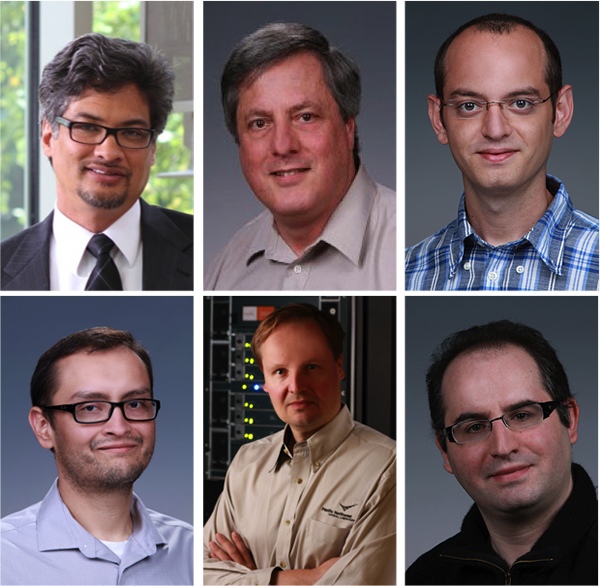Advanced Computing, Mathematics and Data
Research Highlights
June 2017
NIAC's DARPA Project is Nothing to 'HAGGLE' About
A team from the Northwest Institute for Advanced Computing and PNNL’s High Performance Computing group recently were awarded a multi-million dollar project as part of the Defense Advanced Research Projects Agency (DARPA) program Hierarchical Identify Verify Exploit, or HIVE. The NIAC-led project, dubbed “HAGGLE” for Hybrid Attributed Generic Graph Library Environment, is expected to run for about five years with the goal of providing a software development kit that enables programmers and analysts “to leverage the full power of the HIVE platform.”
 (Clockwise from top left): Andrew Lumsdaine, John Feo, Vito Castellana, Antonino Tumeo, Andres Marquez, and Joseph Manzano. Enlarge Image.
(Clockwise from top left): Andrew Lumsdaine, John Feo, Vito Castellana, Antonino Tumeo, Andres Marquez, and Joseph Manzano. Enlarge Image.
DARPA’s HIVE program aims to develop a single graph analytics processor that can achieve 1,000 times improvement in data processing efficiency. This capability is expected to have broad applications to varied problems in areas such as cybersecurity, social media analysis, and infrastructure modeling.
To contribute to HIVE’s goal, HAGGLE’s software development kit will include a hierarchy of graph primitives, extendible application program interfaces (APIs), a hybrid data model, a data flow model and code transforms, data mapping mechanisms, and an abstract runtime system designed specifically for HIVE systems. Using HAGGLE’s software, non-experts will be able to prototype code rapidly, while experts will have the option to apply domain- and system-specific optimizations.
The HAGGLE team features Andrew Lumsdaine, NIAC’s Chief Scientist, and John Feo, NIAC’s Co-Director, as principal investigators. Vito Giovanni Castellana, Joseph Manzano, Andres Marquez, and Antonino Tumeo also assisted in the winning proposal effort.
Related:
